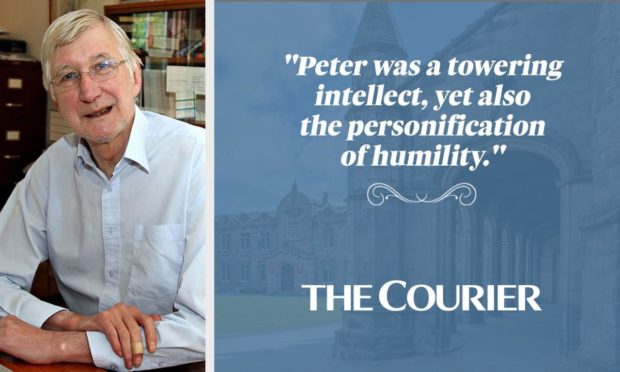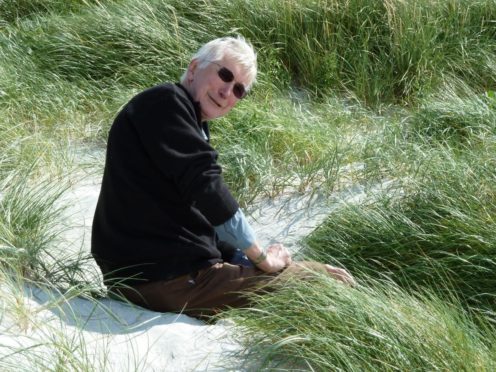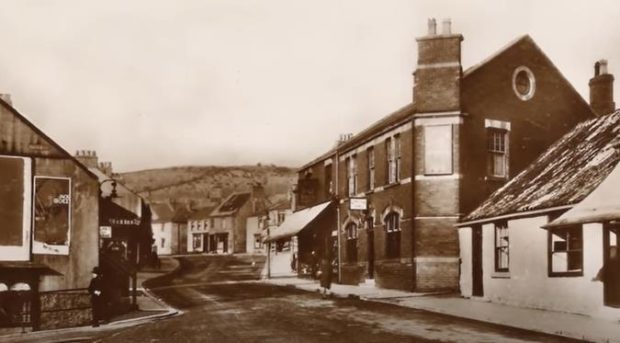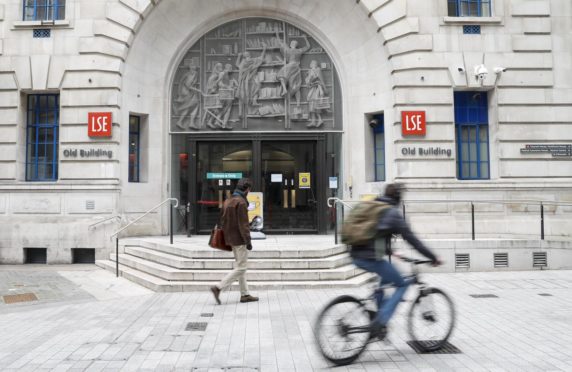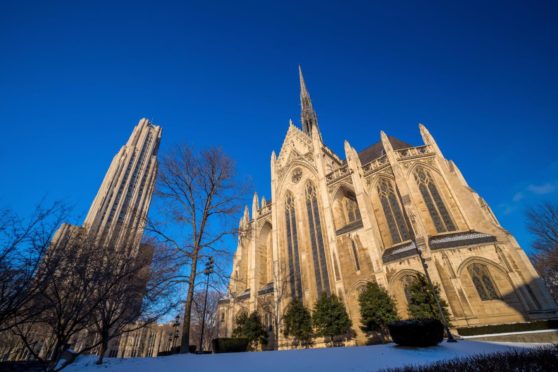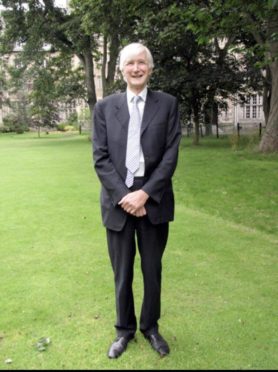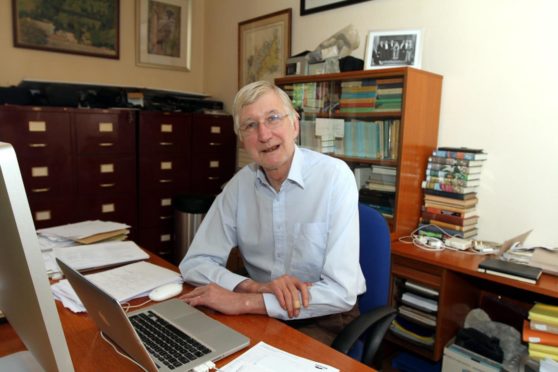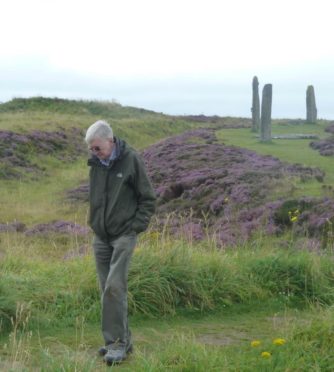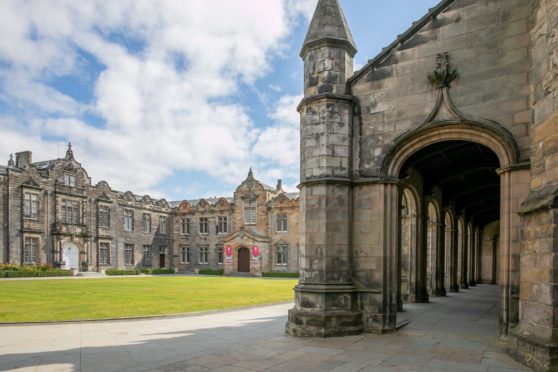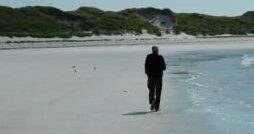His life began in the blackened streets of a working class mining community.
The son of a grocer, Peter Clark would perhaps have been expected to take on the family business.
But an inquisitive mind and sharp intellect saw him trade a life in a brown retailer’s overcoat, for one of caps and gowns in the hallowed corridors of St Andrews University.
Acclaimed as one of the outstanding philosophers of his generation, we look back on the life and achievements of Tayport’s Professor Peter Clark, who has died aged 73.
Industrial heritage
Peter James Clark was born on March 3, 1948 in the small County Durham town of Houghton-le-Spring.
His father, Robert Davey Clark was a grocer.
He and his sister Anne, now deceased, were educated in local schools but university beckoned for Peter.
Love in the midst of academia
Peter started his academic life with an honours degree in Mathematics and Philosophy from the University of Manchester in 1966.
Also a maths student there was Rosalie Elizabeth Speak.
The daughter of Barbara and Thomas Brian Speak – a building society manager – from Scarborough, the couple met and fell in love during their studies.
They married in Rosalie’s home town in 1973 and moved to London so Peter could take on an MSc in Logic and Philosophy of Mathematics, and then a PhD at the London School of Economics.
London calling
Sally Mapstone, Principal and Vice-Chancellor at St Andrews University, said: “The LSE was central to Peter’s intellectual formation.
“He was at the heart of an influential group of young scholars working between history and philosophy of science.”
Peter would go on to teach at LSE, before undertaking a Mellon post-doctorate qualification in the Cathedral of Learning at Pittsburgh University.
A new home in Tayport
In 1978 he was appointed lecturer in Logic and Metaphysics at the University of St Andrews.
A move to Newport Road in Tayport would not only facilitate a flourishing academic career, but it would allow the Clarks to start a family.
Daughter Emily, now 38, would arrive first followed by Thomas, now 36.
“My father loved Tayport. He was a wildlife enthusiast and our garden there was cultivated to be a haven for all kinds of wildlife.
“Both my parents were long standing members of the Scottish Wildlife Trust. My father loved to speak about the Trust and Scottish plant and animal life.
“And he loved taking friends to see his favourite places, such as the Montrose Basin.”
Sadly, Rosalie passed away in 2011.
Teaching at St Andrews
Sally Mapstone added: “Peter influenced the lives of many students over generations, and was never happier than when he was in front of a class.
“His teaching was always well received by students, for its clarity of explanation and his ready willingness to engage in discussion.
“The classes he taught ranged from philosophy of science through philosophy of mathematics to metaphysics and formal logic.
“These are topics which many students find daunting and rather dry, but which Peter was able to make accessible and enjoyable.”
Accolades and achievements
- 1992 he was Associate Dean of Graduate Students
- 1993 his work included in the Philosophers’ Annual
- 1997 to 2004 he was Editor of the British Journal for the Philosophy of Science
- 1997-98 Vice-Principal for Research and Provost of St Leonard’s College
- 2002 -2009 Head of School of Philosophical and Anthropological Studies
- 2007 to 2011 he was Secretary-General of the International Union for History and Philosophy of Science
- 2011 Vice Principal leading on 600th anniversary celebrations
- 2013 Dean of Arts
Tributes paid
Professor Tony Prave described Peter.
“He could speak authoritatively on subjects spanning the mating cycle of kestrels, to the possibilities of life elsewhere in the universe, to where the best bit of machair could be found on Harris.
“A towering intellect, yet also the personification of humility with kind words for everyone and time for all. He eschewed pride, but spoke proudly of his daughter, Emily, and son, Tom.
“He will be missed deeply as a colleague, and more deeply as a friend.”
‘Riding the tiger’
Peter had his own teaching and management style.
Self described as ‘riding the tiger’, aside from the occasional baring of teeth, both he and those under his direction thrived.
His constant good humour, even in the face of serious illness, was his hallmark.
Principal Struther Arnot was said to have greatly valued Peter’s ability to bring his “incisive but calming mind to bear whenever an intractable problem, sudden emergency or a particularly delicate issue might arise.”
A love of Scotland
Emily Clark said: “In recent years my dad enjoyed holidays with Tom around the Scottish coastline.”
Which was a far cry from their early family breaks to the USA and Canada to coincide with Peter’s academic speaking engagements.
“There’s a lot to read about my father in terms of his work in academia but I guess the thing I will remember him for is his sense of humour and being incredibly generous with family, friends and colleagues.
“If I was to sum him up it would be ‘family and wildlife’.”
Immeasurable loss
“Emeritus Professor Peter Clark, one of the outstanding philosophers of his generation, a gifted and committed teacher, and a towering intellect whose contribution to the life of this University is immeasurable,” Sally Mapstone, concluded.
In memory of their father Tom and Emily have established a Just Giving page, which you can visit here.
